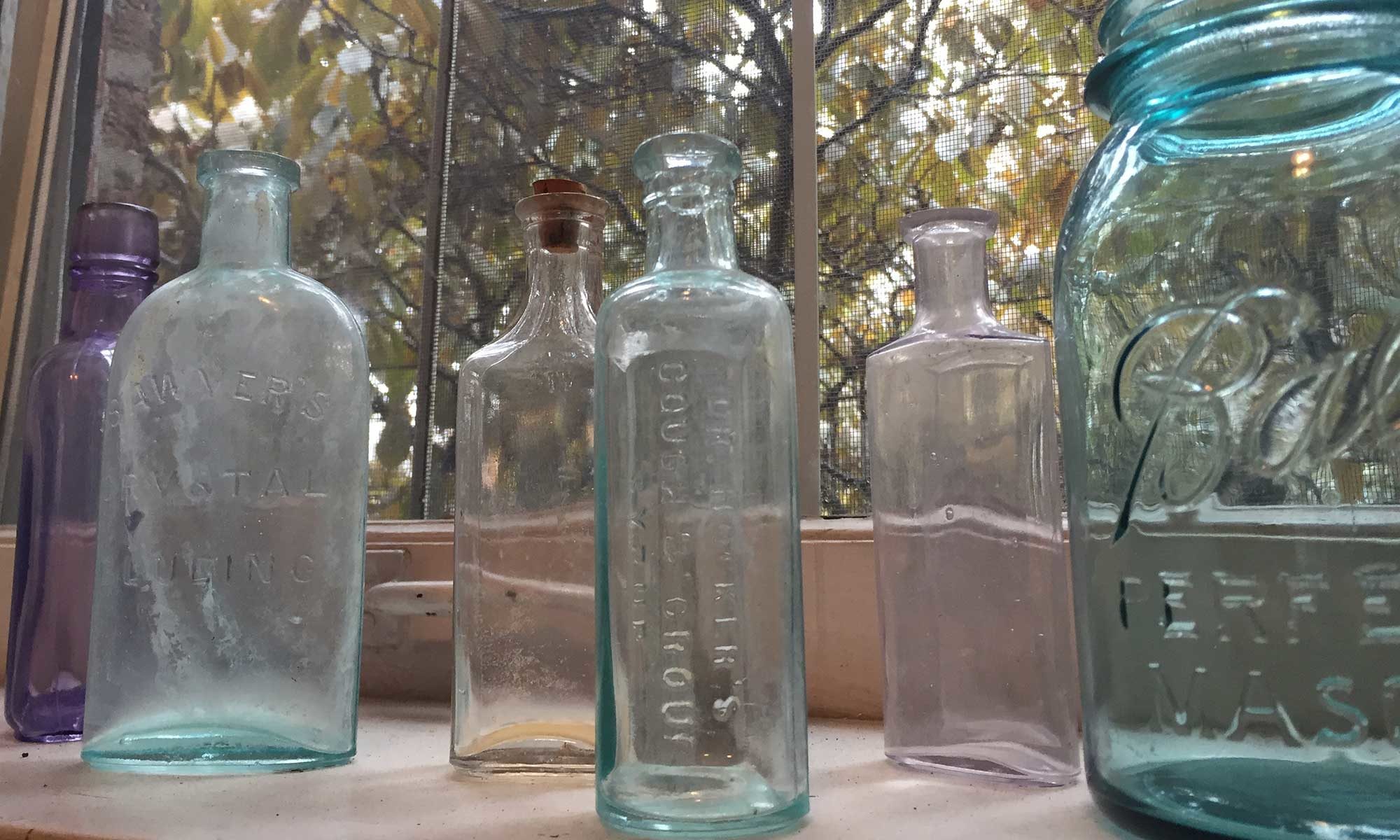So sue me, I really like patchouli.
Ghosts in photographs
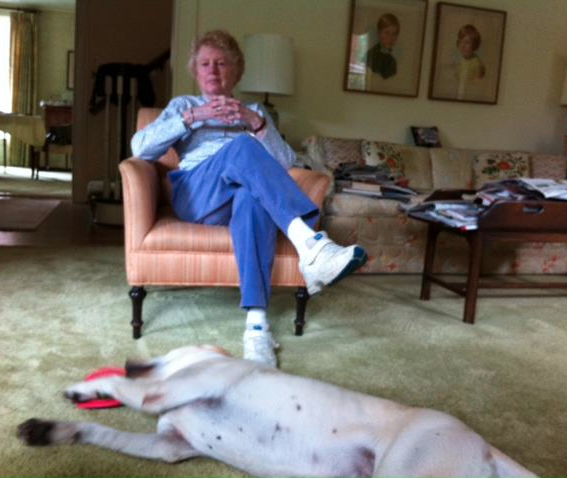
This photo of my mom from five years ago appeared on my Facebook feed today.
Yesterday I happened to realize that I’m terribly afraid of losing my memory. I hadn’t known it before I wrote it, but it occurs to me: my mother’s cognitive injuries spawned a state of traumatized memory that persists in me.
What did I come in here for?
Where did I put my list?
I’m haunted by echoes of her voice.
I would lose my head if it weren’t attached.
I’m so tired.
She said that one a lot.
As time passed, she spoke less and less. It seemed to take a great deal of effort to summon her faculties for a conversation.
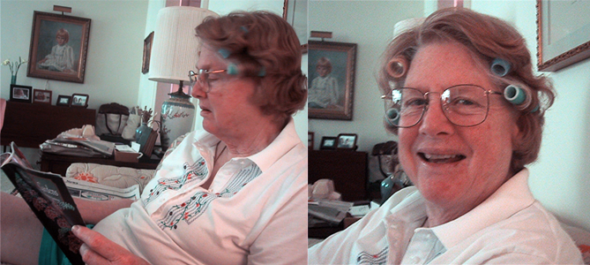
Before, she’d dominate the room. She’d talk and talk—mostly about herself and the things that concerned her, telling the story of her past, her adoption, her hunt for her biological mother. She told that story over and over to people she’d just met. It was her repertoire. She was fey and funny, and she charmed people.
It’s odd to me now that my siblings and I don’t really talk about the things that made our mom herself. We talk a lot (mostly one to another behind closed doors) about how our mom was lost to us at a young age. We talk about growing up (and going away to boarding school) in the aftermath of the loss. Seldom do we recall together the specific ways she was before. I expect the loss overshadows actual memories.
When she went in for the first surgery, I was five years old, so I have only wispy bits of her from the time before.
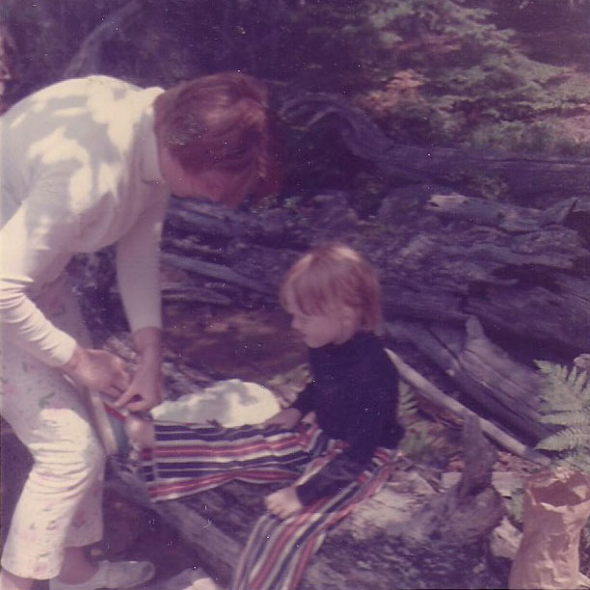
By general consensus she was pretty great. Not that she couldn’t also be pretty awful–at times small-minded and straight-up mean. But only if riled. She was dynamic. Vibrant and vivid.
Even after the surgeries she was still some of those things. Drastically changed, yes, but feisty, joking Betsy on occasion still. This is the thing my siblings, who tell me again and again how they knew her before, how I never had the chance (it is a familial refrain), don’t understand—my mom was all those things she’d been before, just in fits and starts.
And in truth those blips petered out as the cognitive damage she’d suffered from multiple brain surgeries compounded with years of medications and made unrecoverable inroads into a once powerful presence. In time the dementia was diagnosed and made concrete. And that began the long process of brushing her away altogether, fading gradually like an old photograph, until she was little more than a ghost of who she’d been.
All of our mother’s plantings are gone
Yesterday my sister called to tell me– our dad had landscapers come and scrape the whole mad DIY gardening jungle into a sheet of lawn with a few trees for effect. As she recited the losses, she wept: “The jack in the pulpits, the wild irises, the roses–all of it gone, Sarah. All those plants I helped her propagate.” They gardened together for years before the dementia spun things entirely out of control. For a time it was their literal ground for connection, for crafting a living history together. And my father obliterated it.
I don’t know what to say to him. Of course I love him, which is always the first thing. But I’m having serious problems with some of the decisions and actions he’s made in later years. Growing up, I watched him and my mother wage simmering, bitter campaigns against their own parents. I’ve always tried to understand, even when it’s a struggle to empathize.
And I guess I do and I don’t understand my dad’s actions. My mother and all her array of damage defined the very parameters of my father’s life for long, long years. Nearer the end it grew intolerable. I understand the impulse he must feel to rid himself of all the pain and recrimination. I understand the compulsion to wipe the slate. But as our father he fails to consider how his actions might affect us. We don’t exist in his reckoning. Clean house. Check.
This sweep has gone on for months in donations to various organizations and enterprises. Longer than that– it started before Mom even died. When he gave away Uncle Sharkey, he said, “Mom agrees”– despite the fact that the dementia didn’t leave her with a whole lot of agency and decision-making capability. She sort of became a mostly-amiable, rather vague woman. My sister and I speculate that our father is building some type of legacy, but it’s a haphazard and idiosyncratic one if that.
As much as I try to wrangle the psychological reality he operates in, as a would-be parent, I just don’t get it at all. I would want my kids in better communication. If I were counting down my final days, my kids would be foremost in my thoughts. But as he systematically rids our childhood home of reminders and heirlooms, not once does he stop and turn us and say, I want this thing out of the house. Who will take it?
In truth we have never factored that prominently in his daily endeavors at all. So it’s really no change in behavior or outlook. It just comes into sharper focus when death enters the picture. We all want pieces to hold onto. When my mother died, I took a teaspoon of her ashes to keep in a cut glass perfume vial on my dresser. The dresser from my grandmother’s house. I have planted the Easter lilies I bought this year in her memory. These pieces continue and connect us, and they are important. And my father doesn’t see it, and I don’t know how to, or if I even can, tell him.
the tree
In April my sister called to tell me that my mother’s tree was gone, that my father had toppled it.
That towering white pine dominated the backyard for years. It was grown from a sapling Mom had transplanted from the north woods. There’s the tale my dad tells of how, after the tree’s top was severed in an ice storm, my mom tied up one of the lower branches, and it grew to become the new leader as the tree grew straight and strong. That knee-high tree grew taller and fuller, just topping our heads as the fine-needled backdrop in one series of family photos.
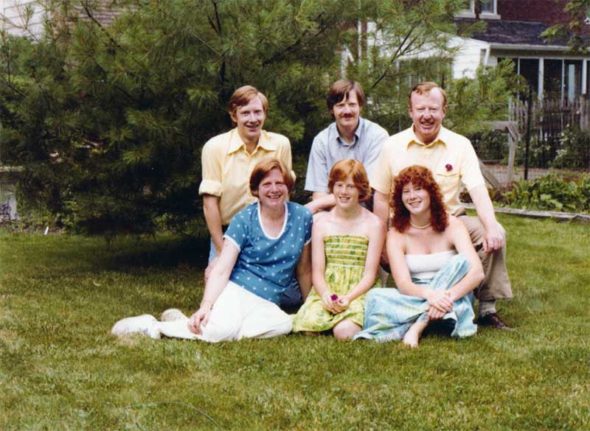
Through the years after I was gone it loomed larger. The grass beneath the tree dwindled as the ground filled with dropped needles. My parents’ dog would go out and lie in the pine straw and come back covered in pitch.
I can understand my father’s fatigue of the thing. He lived closest to it, after all. Our resentment of his action is at a remove. We are only thinking of the story of it and of its loss from the skyline, as we walk around the corner from my sister’s house.
the very last flower arrangement
I dreamed of my mother– not her living, breathing, walking self, only accidental snapshots my father found on an old camera. In the pictures she’s going down the staircase and back up again. My grief for her upon seeing them has weight and presence. I find a flower arrangement she’d made wilting in a corner with one large reaching orchid leaf, a bunch of red holly berries, and two protuberances that resemble cucumbers. I announce it to the others in the house as her final flower arrangement and tell them to say goodbye as I carry it to the trash.
foundlings
I’m walking down a dark street when it starts to rain. I come upon a place where someone has left a bunch of old furniture out in the alley. A table catches my eye, and I walk over– but it turns out to be a chair, and I lose interest. Then I see standing off by itself a beautiful, pristine antique white gas stove. It’s a small model and embellished with delicate decorative flourishes. I think, Chris would love this, and raise my phone to photograph it.
Suddenly I’m taking a picture of a smiling baby girl in an old high chair over against the brick wall. I have a hard time holding my phone steady and end up taking a bunch of blurry shots. A yellow flower on a table in the foreground keeps getting in the way, so I
there are the constants to my weekdays
The train, the walk, the pavement. I vary my route depending on the red lights on Michigan Avenue. There are, as well, the revolving variables. On the train or walking from the train to work, I see the same people over and over, as if I know them, though I do not know them.
The girl whose hair is always tangled in the back, as if she is a restless sleeper who has tumbled from bed into work clothes, into her army green duffle coat.
The tall dark-haired guy in the Members Only jacket and Adidas sneakers who seems to have walked out of the 1970s and bounces a little as he strides along long-legged, crosses streets on the diagonal, unbothered by corners and cross walks.
The guy in the red and black down parka with his bike messenger bag slung across his torso, who smokes in the morning. He meanders ahead of me as I jog side to side, trying to dodge by, trying not to inhale.
The panhandler who sits rocking forward and back, shaking change in a 7-11 to-go cup in the steady rhythm of his rocking, saying good morning to each passing person regardless of headphones and averted gazes.
I see the same clothes and boots and bags on different people– the furry hooded parkas with the round goose patch insignia, the navy shoulder bag with the leather straps. This uniform. I was absent the day they assigned it.
There are the two girls in scrubs– girls, not women, although adult– walking together to the hospital, chatting in their chirpy bird voices. Pretty grown up girls who were pretty little girls. I imagine their happy childhoods with healthful extracurricular activities. I imagine their lack of suffering more than the death of a beloved grandparent. Sometimes they’re joined in the walk from the train by an Indian guy who wears a cap with ear flaps. I imagine catching up to the girls and walking with them. I imagine making them my friends.
For several mornings I see one of them without the other and wonder: Did she just change shifts at the hospital? Has she gone away, to another hospital, another city, another state? Is the one she left behind lonely? And I, will I never see her again?
And then one day I step off the train, and there they both are, going up the escalator, having their morning conversation. And all is as it should be.
half bald old dog
…walking with her old man, approaching the entrance of the Penninsula Hotel, barks once, pauses, barks twice. Pauses. Two more barks and she’s under the canopy, turning toward the small door to the side of the grand entrance. One more bark. Out bustles the doorman, says, “I didn’t know if you’d be here,” reaching across the valet desk and into a jar of treats. Her man replies, “She wouldn’t miss it. She would not miss it.”
homeless man
whistling bird calls in the subway
all the winter days
The dry days, the snowy days, the falling ice signs set out conscientiously along the sidewalks in front of high rises.
And then the day in March when ice finally comes dropping down in clear fragile panes that pop when they hit the pavement.
